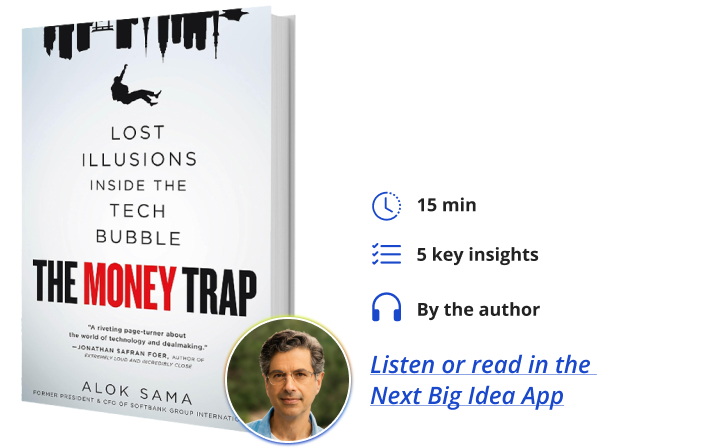Alok Sama is the former President and CFO of SoftBank Group International. He previously served as a Managing Director at Morgan Stanley Bank.
Below, Alok shares five key insights from his new book, The Money Trap: Lost Illusions Inside the Tech Bubble. Listen to the audio version—read by Alok himself—in the Next Big Idea App.

1. Be crazy, my friend.
To succeed as a technologist, sometimes you need to be a little bit crazy. Like Masayoshi Son, who hits targets nobody can see and wants to be remembered as “the crazy guy who bet on the future.”
In the mid-nineties, Masa foresaw the internet revolution. At the height of the 2000 tech bubble, he owned 8 percent of all internet stocks, briefly making him the richest person in the world. He also had an agreement to buy a third of a small online bookseller called Amazon, but he ran short of cash. Later, he bought a struggling phone company five times the size of his SoftBank, based on a vision of connected smartphones—before the iPhone existed. He also made a $20 million bet on a Chinese schoolteacher with “strong and shining eyes” and turned it into the greatest venture investment of all time: a $100 billion stake in Alibaba. His audacious $32 billion acquisition of chip designer Arm Holdings was a bet on a tomorrow of “connected and intelligent things” and is now worth almost $200 billion.
Masa’s unique brand of crazy is a canny competitive strategy. When Masa Son’s capital cannon gets behind a business, the competition frequently folds, as Uber did in China and Southeast Asia after SoftBank invested in its local competitors. Because, as Masa memorably says, in a fight between a smart guy and a crazy guy, the crazy guy always wins.
2. …but don’t get too crazy.
“Craziness” can sometimes become hallucinogenic: coworking space provider WeWork’s mission was to “raise the world’s consciousness.” Valued at $47 billion in 2019, WeWork eventually filed for bankruptcy.
“Performance attracts more capital, and in their bad years, star managers destroy more absolute wealth than they make in all their good years combined.”
Following the WeWork debacle and SoftBank’s 2022 results, Masa Son proclaimed, “I am ashamed of myself for being elated by the results of the past.” In acknowledging hubris, Masa displayed rare humility and an earthy wisdom that eluded the biggest names in the investment business. While self-delusion is indispensable for great athletes, financial markets routinely eviscerate Jedi investors who challenge its omniscience. With the possible exception of the late James Simon, when measured in absolute terms, no investor in history has been able to beat the market consistently. Performance attracts more capital, and in their bad years, star managers destroy more absolute wealth than they make in all their good years combined.
In the investment business, the caricature of smart money and dumb money is classist, reductionist, and false. In bull markets, all money is smart money, but every decade or so we are reminded that speculative markets are mostly a case of dumb and dumber.
3. The money trap.
SoftBank’s corporate mission is “Happiness for Everyone,” harking back to an era where technology meant life-changing inventions like airplanes and light bulbs. But where are those autonomous flying cars and levitational hyperloop tunnels when you need them? I asked myself while stuck in gridlock on the US101 in Silicon Valley. Who needs another silly social network?
SoftBank’s $100 billion Vision Fund was meant to fulfill Masa’s vision of leveraging technology to make the world a happier place. I don’t know about happiness, but he certainly changed the conversation in tech investing. Tiger Global, Sequoia, and others all responded with mega funds of their own.
The problem with giving founders too much capital (as technology investors did in the era of free money) is they tend to spend it, and usually not wisely. In technology investing, as in life and the search for happiness, more money isn’t always the answer.
4. Beware artificial stupidity.
Ten years before the launch of ChatGPT, Masa Son would talk to me obsessively about AI and the singularity. At the time, this was a largely theoretical future event in which machine intelligence might surpass human intelligence. While Elon Musk’s Neuralink project sought a Vulcan mind-meld with machines to control them, Masa put his faith in companion humanoids with “emotional intelligence.” And while Musk seeks to colonize Mars in preparation for doomsday, Masa remains evangelical about his faith in a benign AI.
“As with self-driving cars, when it comes to damaging humanity, we seem to set the bar higher for machines than humans.”
Like Masa, I believe in AI as a revolutionary productivity tool for people and enterprises. As with self-driving cars, when it comes to damaging humanity, we seem to set the bar higher for machines than humans. My pet peeve with AI is the worms inside my brain telling me what to read or listen to next. A Spotify algorithm would never have fed the street music of Soweto to Paul Simon, but this was the inspiration for his masterpiece Graceland. Dilute intellectual curiosity and the machines will win in any conspiracy, real or imagined, to dumb down the human race.
5. If you need a friend, get a dog.
Thanks to Michael Douglas’s Gordon Gekko, as a youthful immigrant to Ronald Reagan’s America, I learned that greed was good, lunch was for wimps, and that my bourgeois dream of “making $400,000 a year, flying first class and being comfortable” was for losers. But Gekko had another powerful lesson I had to learn the hard way: if you need a friend, get a dog.
I should have been tougher, considering the business I was in, but I wasn’t. I disintegrated when confronted with a relentless smear campaign that involved my family under surveillance, fabricated anonymous complaints to regulators, and home-delivered blackmail threats. I didn’t quit because nobody does. Nobody walks out on money and power. But following the death of my parents and with my mental health at risk, I finally listened to the voice that had long been whispering in my ear. I walked away moneyed, but I paid the price because not only is lunch for wimps, it is never free.
To listen to the audio version read by author Alok Sama, download the Next Big Idea App today:
































